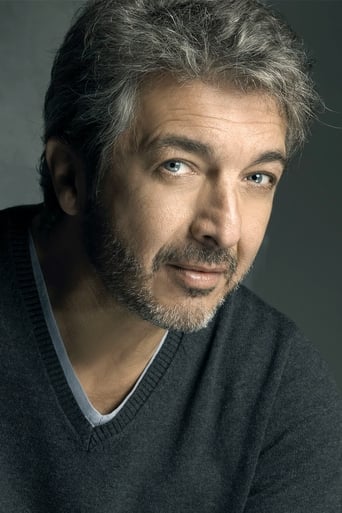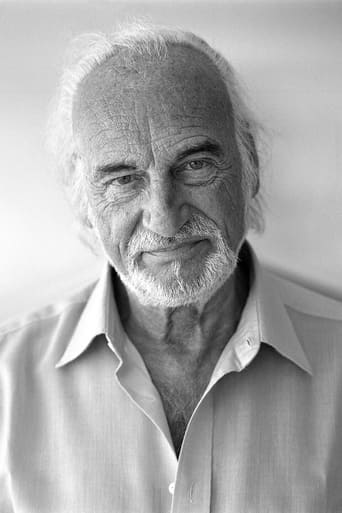AnhartLinkin
This story has more twists and turns than a second-rate soap opera.
Kien Navarro
Exactly the movie you think it is, but not the movie you want it to be.
Zandra
The movie turns out to be a little better than the average. Starting from a romantic formula often seen in the cinema, it ends in the most predictable (and somewhat bland) way.
Maria Suarez
"Kamchatka": More Than Just a War Game By: Maria Fernanda SuarezIn the Film Appreciation elective at my school we decided to watch the movie "Kamchatka" in the World Cinema Unit. Considering we are Latin Americans we decided to choose a movie from the region, although most of these movies are not easily available for rent or purchase. "Kamchatka" was a good choice because it reflects very efficiently the realities of the life for Latin Americans during a crisis. Although not everyone can relate to living in times of war, the movie focuses more on the family aspect of the situation, allowing most people to be able to connect to at least one of the characters.The movie "Kamchatka" is a narration about the way a young boy, Harry (Matías Del Pozo), interprets the historical events going on in his country. The storyline takes place in Argentina during the dictatorship of José Videla, featuring the coup d'etat in 1976 when he consolidated his power. His reign was right- winged and it was one of terror; anyone opposing the government's ideas was either killed or "disappeared." One afternoon Harry's mom picks him and his younger brother, El Enano (Milton De La Canal), early from school. The family must leave town for some time and retire to a house in the country. The movie follows the hardships of these troubled times from the eyes of a young boy who does not fully understand what is going on. Harry and his brother try to make the best of the situation, but their boyish curiosity creeps up often and their parents struggle to explain things in an understandable matter. Despite the parent's ability to keep the kids out of the conflict, in the scene with the grandparents it becomes evident how the political events are present in everyone's life, even in that of the youngest.The actors in general did a great job of portraying a family living in times of hardships by not over exaggerating events and dealing in common day-to-day situations and settings. For example, in the restaurant scene, the main family is shown dealing in an environment with other families. It highlights their troubles but does not making them overly evident as to seem fake. The kids' mom (Cecilia Roth) did a specially good role in the movie. Her smoking is the only way she can let out the frustration she feels as a concerned parent, considering that she has to keep a strong outer attitude to help her kids get through. The children's naiveness towards what is going on and their expected childish dilemmas also show very good acting from their part.What I enjoyed most about the movie "Kamchatka" is that it allows the viewers to put together the puzzle pieces of the story. We are never told why the family must leave, probably because this detail was not of much importance in the eyes of the narrator; Harry. This space for speculation engages the audience more and permits them to accommodate the movie in a manner that they can find useful. The physical settings of the story, specially the grandparent's house with the beautiful lake, show picturesque scenes that are memorable. The aspect that I liked the least in the movie was the lack of an emotionally impacting moment or action. I felt that the movie is missing a touching scene that binds an audience to a movie. Small details such as the mother's joy when Harry comes back from his escape do illustrate sentimental moments, but none stands out."Kamchatka" reinforces the value of family and love by showing the fragility and non- importance of material processions. The movie is an eye- opener to realities many people would not be exposed to in their usually conditions. In turn, it warns its audience about the severity of wars. The fact that Harry and his father play the war board game TEG emphasizes the foreshadowing of the evils of war. The only time Harry comes close to winning, his father holds on to one country: Kamchatka. This action of the father's to hold on to something till the very end, both in the game and in their real life, brings to light the values of dedication and perseverance.Younger kids would probably not understand the prevalent and underlying conflict, yet they would be able to follow the simple tram of the kid's actions and enjoy the movie. It is very adequate for teenagers looking to experience a different culture and learn about a historic event in a more personal way. The magic about the movie is that anyone can connect to some aspect of it; either the situation, a character, or the time period. Rating: 4/5*Maria Fernanda is a sophomore in a Costa Rican high school. Her favorite subject is History, being it the reason attributed to her passion for reading and watching movies. She feels both books and movies tell incredibly valuable stories that give the audience insight into events they would never know about. She believes that the power of these communication tools is so strong they can definitely change the world for better or for worse.
mylesy27
I watched this as part of a film festival 2 years ago and it still lives with me today. As tender and compelling a depiction of love within a family as it is an indictment of the atrocities of the Argentinian police state which left so many unaccounted for. Beautiful, measured acting and direction matched by the cinematography and scripting. The focus on the relationship between the father and his two sons is heart-rending - gentle, subtle details of their bond and love for each other heighten the sense of dread as the net closes in. The final scenes are real, devoid of Hollywood soft-focus sanitising. Behind this story are countless personal tragedies, the realization of which only serves to make the emotions flood deeper still within you. I saw this in Auckland, NZ, and at the end of the screening silence filled the auditorium. No one moved. A small group at the front, one with an Argentinian flag, formed a circle and held a silent prayer together. This is a film of real power, go and see it.
figuko
Kamchatka is a terrible film. I believe what seems to pass for "understated" is its plain dullness, and the main character (a kid whose POV is nominally carrying the movie) doesn't show a single instance of child-like perception - save for a couple of commonplace animal shots, the kid sees the world exactly as the rest of Piñeyro's characters; a polite, well-framed shot by Alfredo Mayo.
Since "Caballos Salvajes" I've been trying to figure out who the bad guys are in Piñeyro's films (back then, bullets always came from outside the frame). I'm sad to report things have gotten even worse, since now we need to resource to _our_ (external) knowledge of the period to understand what's going on. He seems to get away with it because, sadly, not that much happens in the movie, anyway.Kamchatka might be worth seeing, however, if you're interested in recent developments in the political genre. It was interesting to me how, by trying to detach itself from the political movie tradition, it achieves the complete opposite: this is a film that couldn't possibly make sense unless you are not only aware of the external circumstances that affect the characters but also have already a clear position on the political conflict in case.As justified as the generic, elegiac tone of the movie may be in the real world, its fictional consequences are devastating. It leaves us with no real characters and not a single dramatic scene proper.Characters here are archetypes and, most of the time, it's not entirely clear of what. It doesn't help that the movie looks often derivative of other films that have successfully portrayed the specifics of perception in children (the soundtrack mimicking Thomas Newman is particularly painful in that respect).Piñeyro's former writer (Aida Bortnik, who also wrote The Official Story) used to be quite annoying to me, but at least she seemed to know and like drama as a tool.
agent_starling_1999
Like "Harry", I always enjoyed playing TEG. If you have never played it, don´t worry, for it´s actually pretty simple: one board with fifty countries, and three or four players trying to control 30 of them to win the game. But Harry has never played with so many people - he just plays with his dad. And when its only two players, it is a fight to the death: all 50 countries or nothing. Harry has never won before, and he is very close to winning - but his dad, controlling this little, obscure region on the edge of the board, this remote place with a tongue twister of a name, Kamchatka, still manages to resist for hours and hours. As Harry will learn later, surviving against all odds is indeed possible... and as he warns us as the movie begins, this will be the last and most memorable lesson he has learned from his father.A touching tale made up of childhood memories, Kamchatka tells the story of a middle-class couple in Argentina in the mid-70s, during the military dictatorship that horrified and scarred the country. One day, without warning, the couple take their two children to an abandoned house, desperately trying to escape. But of course, the children understand nothing of this - instead they are forced to leave their lives behind and even change their names. The movie cleverly focuses on the older of the two boys, Harry (who actually names himself after Harry Houdini), and suggests the horrors of the period through subtle (and sometimes not so subtle) metaphors, sometimes with a sense of humor you wouldn´t expect for this type of pictures.The good thing about "Kamchatka" is that it is not a history lesson - you never know exactly what the parents (and the other people that come and go into the children´s lives) did to be hiding, but it doesn´t really matter. What matter is that the film accurately portrays the heartbreaking situation of a man and a woman who do not know if they´ll live to see their children grow, and are still strong enough to fight back and try to smile for them. We don´t know what they did when they left the house every day. We don´t know what happened to their friends and co-workers. We don´t even learn their real names - like so many of the "desaparecidos", they are the anonymous victims of a goverment that almost destroyed a country. We only see the couple through the innocent - but oddly wise - eyes of their children.Ricardo Darin and Cecilia Roth have once again proved with this movie that they are some of the best actors in Argentina right now - I´ve seen them both in more demanding roles, mind, and this is far from being their best performances... and yet they are both believable and their chemistry with the children is perfect. Director Ricardo Piñeyro knows what he is doing, and it shows: with this type of material it is dangerously easy to fall into the trap of making a cheap melodrama, and yet he manages (for the most part) to avoid making the picture overly sentimental or manipulative. Kamchatka may not be a perfect film, but it´s heart-felt and beautifully filmed.For viewers who wish to know more about this dark time in Argentina´s history, you may rent the excellent Oscar-winning "The Official Story".





